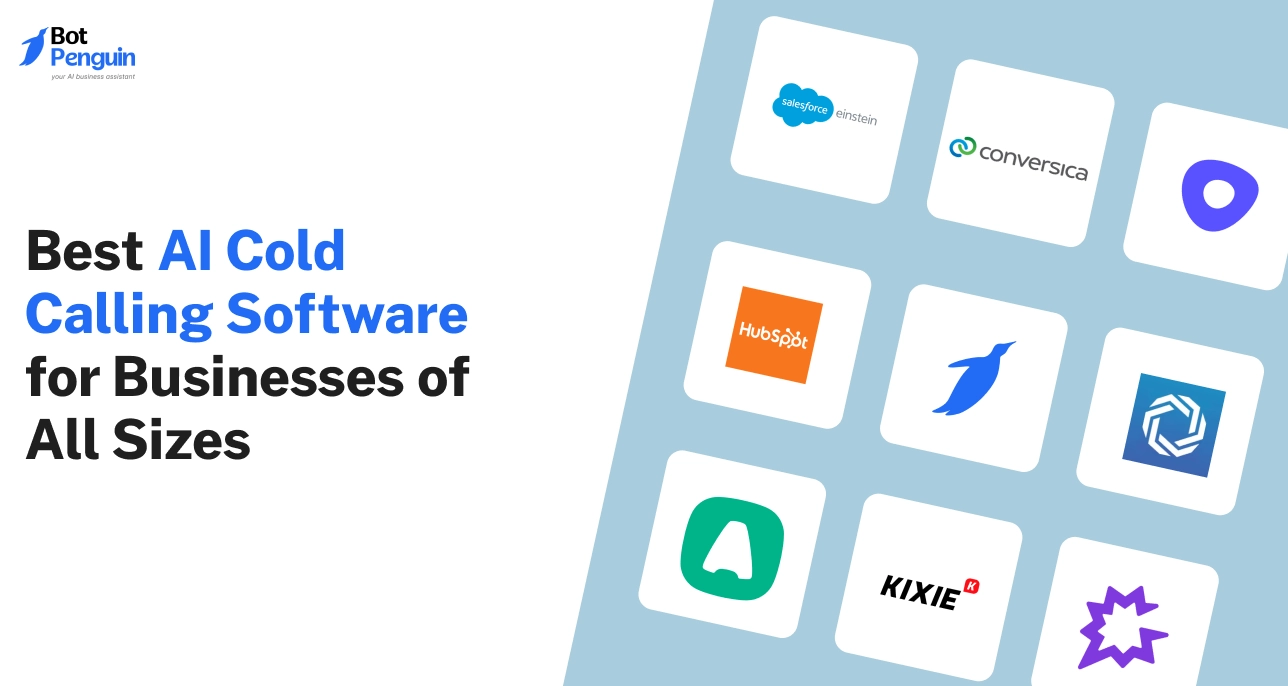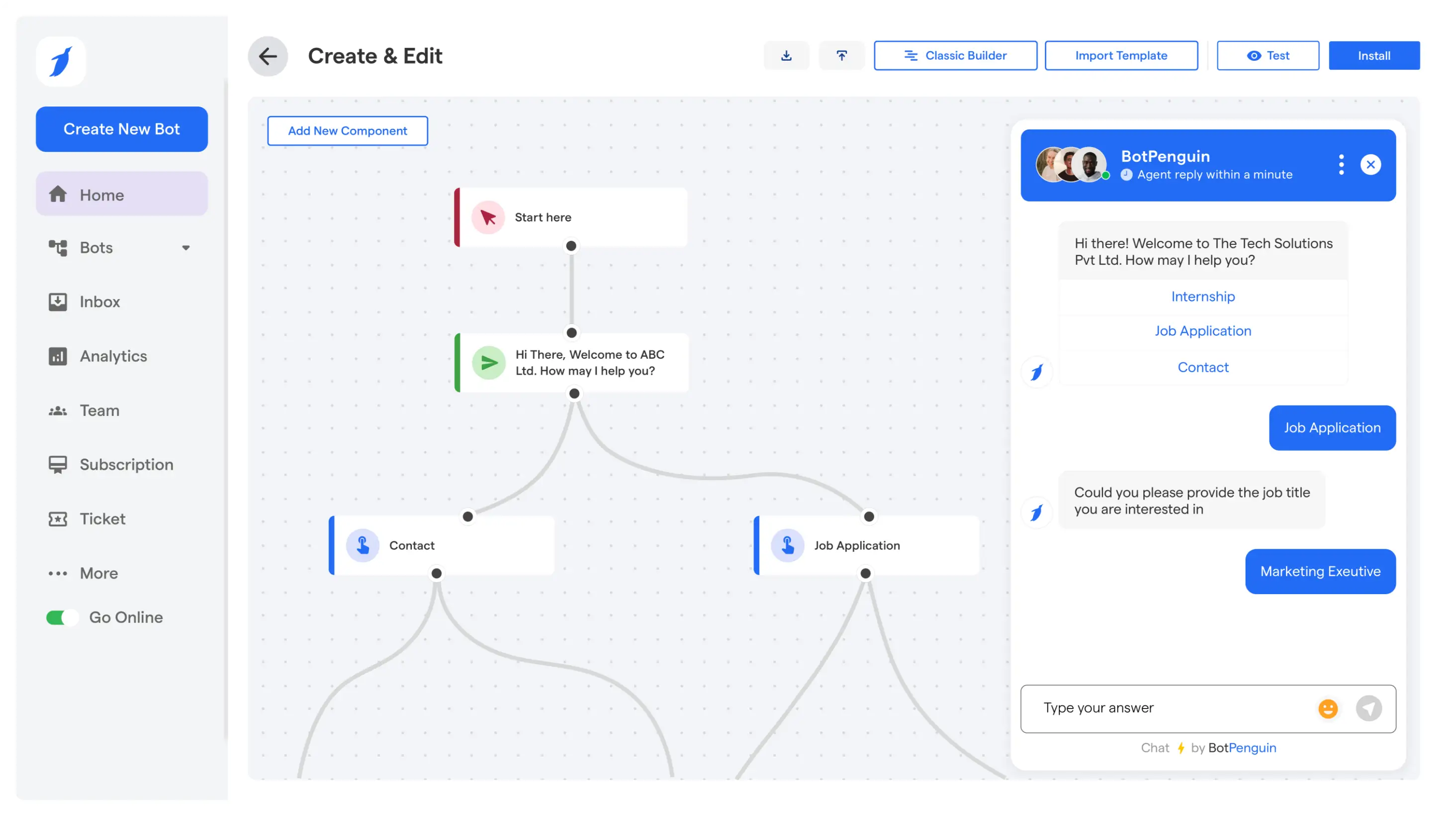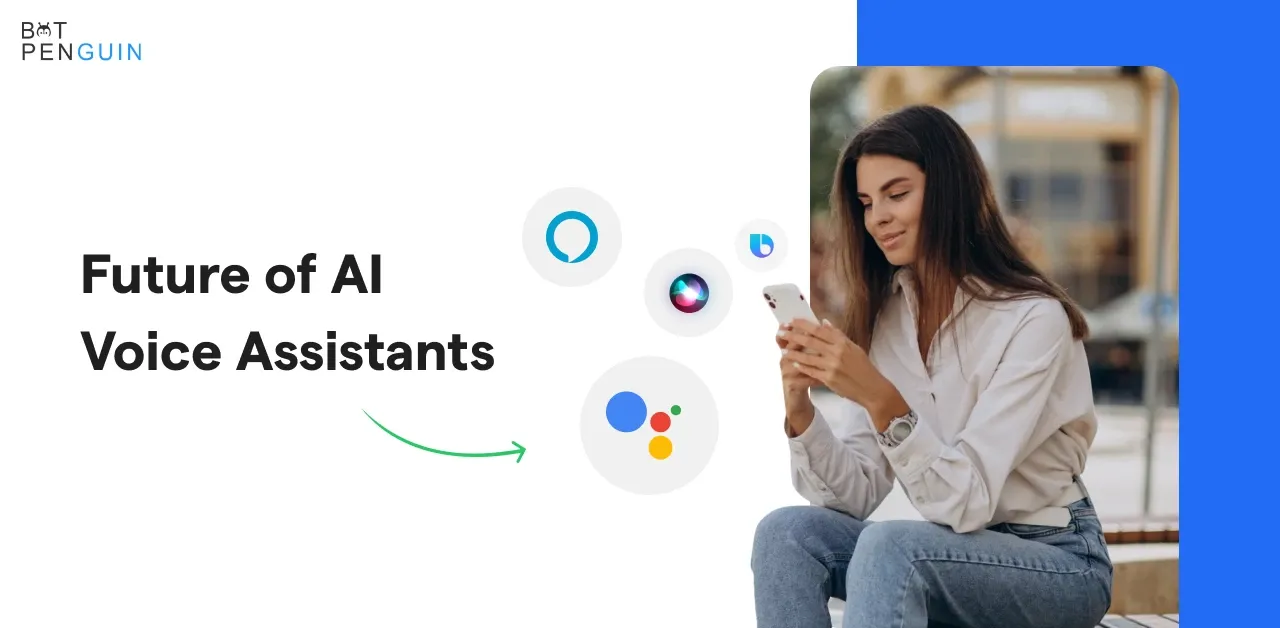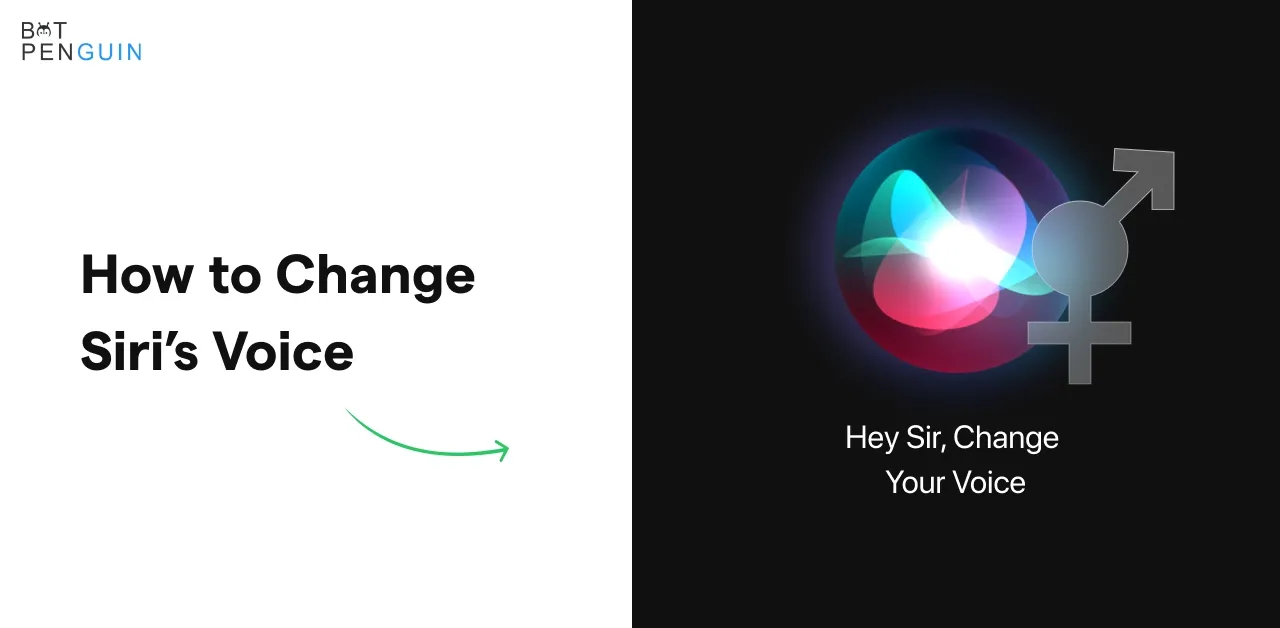Cold calling is making a comeback. But this time, it’s powered by AI.
What once drained sales teams is now driving results with precision, speed, and data-backed insights. Modern AI cold calling software can talk, listen, and qualify leads like a seasoned rep — only faster and without fatigue. Businesses are scaling outreach effortlessly while keeping conversations personal.
This guide explains how AI cold calling works, why it’s transforming sales outreach, and the best tools to get started in 2026. If you’re ready to turn every call into an opportunity, read on.
What is AI Cold Calling Software
Modern sales teams need more than manual calling to reach prospects efficiently. With rising outreach targets and limited time, automation supported by artificial intelligence has become essential.
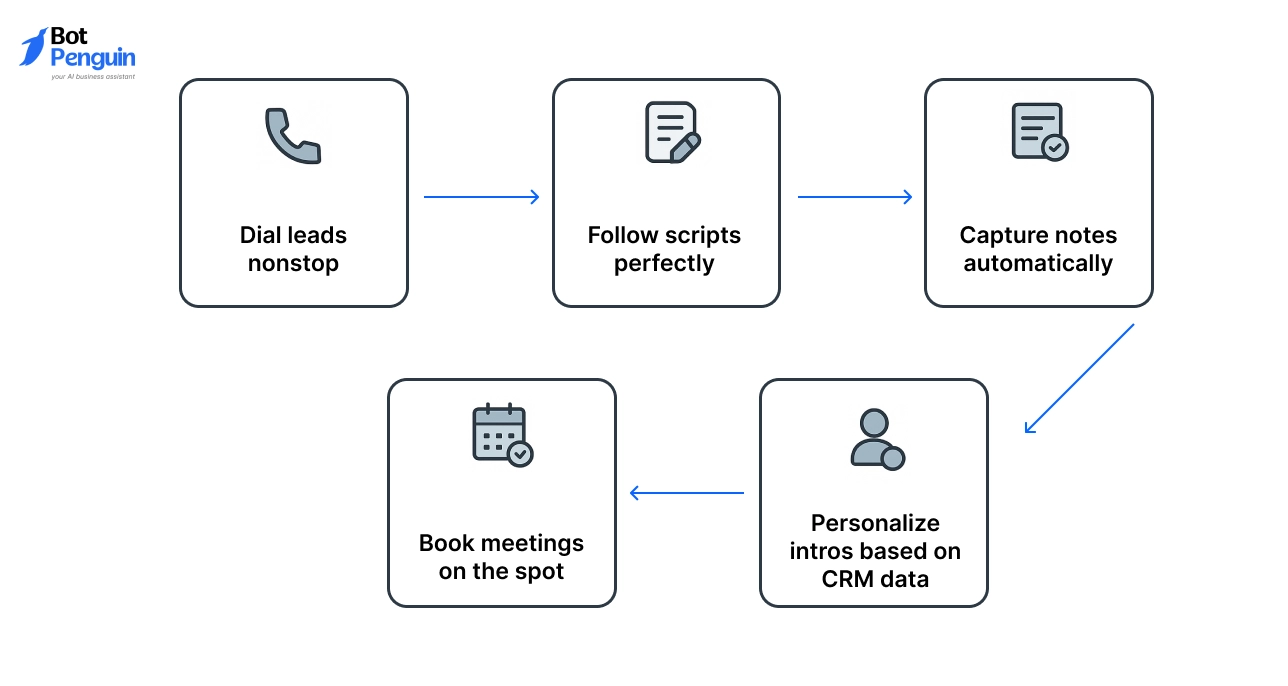
AI cold calling software helps sales teams automate outbound calls, engage in real-time conversations, and manage data without human intervention. It functions as a digital sales assistant that can speak naturally, understand responses, and qualify leads instantly.
For instance, a sales team can upload a contact list, and the cold calling AI software automatically starts calling each prospect.
It delivers a relevant pitch, captures responses, and sends interested leads directly to live agents. This process allows businesses to handle hundreds of calls daily while maintaining consistent quality.
Core functions of AI cold calling systems include:
- Auto Dialing – Enables uninterrupted calling sequences without manual effort.
- Call Scripting – Provides adaptive conversation templates to maintain accuracy and tone.
- CRM Syncing – Updates every call outcome in real time for better tracking and follow-up.
- Analytics – Offers performance reports on connect rates, lead responses, and conversion efficiency.
By combining these capabilities, AI cold calling software eliminates inefficiencies and maximizes agent productivity.
With the foundation clear, the next section explains why more businesses are switching to AI cold calling tools to transform their outbound sales results.
Why Businesses Are Switching to AI Cold Calling Tools
The way sales teams reach prospects has changed completely. Speed, accuracy, and data-driven outreach now define success. Manual calling cannot match the scale or precision needed to convert leads efficiently.
This shift has made the AI cold calling tool a core part of modern sales operations. Businesses are adopting it to increase productivity, improve lead quality, and maintain consistent communication without expanding headcount.
1. Reduced Manual Effort and Faster Outreach
Traditional cold calling depends heavily on repetitive work—dialing numbers, logging notes, and scheduling follow-ups. These manual actions limit how many leads a team can contact daily. With AI for cold calling, automation handles these repetitive steps.
The system auto-dials, records interactions, and routes warm leads to live agents instantly. Teams can focus on meaningful conversations rather than routine tasks, resulting in faster outreach and higher productivity.
2. Smarter Lead Qualification and Better Personalization
AI-powered cold calling systems evaluate every interaction in real time. Using speech analysis and NLP, they identify buyer intent, sentiment, and engagement level.
A prospect expressing interest in pricing or a demo is marked as a qualified lead and prioritized for follow-up.
The same system can personalize future calls using CRM data and previous responses, ensuring each conversation feels relevant and data-informed.
3. Seamless CRM and Omnichannel Integration
Modern AI cold calling tools integrate directly with CRMs, email automation, and communication platforms. Every call outcome, lead note, or response is synced instantly, keeping records up to date.
This gives sales and marketing teams a unified view of every interaction across phone, chat, and email. Such integration ensures that no opportunity is lost and all future engagement remains consistent.
4. 24/7 Scalability Without Additional Hiring
A major advantage of AI-driven systems is their ability to operate continuously. Businesses using AI for cold calling can engage prospects across multiple time zones without expanding their workforce.
The system can handle large calling volumes, maintain quality conversations, and manage follow-ups automatically. This scalability ensures growth without proportional increases in cost or manpower.
In summary, companies are switching to AI-driven cold calling to save time, cut costs, and enhance lead quality. It allows teams to do more with the same resources and maintain personalized communication at scale.
With the reasons for adoption clear, the next section explains how AI cold calling works behind the scenes and what makes it effective in real-world use.
How AI Cold Calling Works Behind the Scenes
AI cold calling technology operates through a structured system of intelligent components that work together to manage every stage of the calling process. Each element contributes to improving response rates, lead quality, and sales efficiency.
Understanding this process helps businesses see how AI cold calling software achieves consistent, data-backed results that traditional methods cannot match.
1. Voice AI and NLP for Natural Conversations
At the center of every AI cold calling tool is the combination of Voice AI and Natural Language Processing (NLP). Voice AI ensures that calls sound natural, clear, and human-like. NLP allows the software to understand speech, detect intent, and respond accurately.
When a prospect asks about pricing or features, the AI recognizes the question, retrieves the right information, and replies instantly. This capability ensures that every conversation feels professional and contextually relevant without human intervention.
2. Predictive Dialers for Prioritizing High-Intent Leads
The next layer involves predictive dialers. These systems analyze data from previous interactions, CRM records, and campaign responses to determine which leads are most likely to convert.
Instead of calling randomly, the dialer organizes calls based on lead intent and engagement level. This means that sales teams spend time on qualified prospects instead of unresponsive numbers, improving efficiency and conversion rates.
3. Sentiment Analysis for Real-Time Response Scoring
During a conversation, the AI for cold calling continuously measures tone, pace, and keywords to understand the prospect’s mood and interest. This process, known as sentiment analysis, assigns a score to each interaction.
For example, if a lead sounds interested or positive, the system marks them for immediate follow-up. If the response indicates hesitation, the AI can schedule a nurturing sequence or escalation to a live agent. This ensures every lead receives the right attention at the right time.
4. Integration with CRM and Sales Automation Systems
Every call and response generated by AI-powered cold calling is automatically recorded and synced with connected CRMs and automation tools.
The integration ensures that lead details, call summaries, and outcomes are instantly available to the sales team. This data flow eliminates manual entry, provides visibility into campaign performance, and ensures future calls or emails are contextually informed.
5. Continuous Data Learning and Optimization
Over time, the system learns from every interaction. It identifies patterns in successful calls, analyzes conversion trends, and refines its approach to improve future campaigns.
This self-learning mechanism ensures that AI cold calling software becomes more accurate, efficient, and predictive with every use.
In summary, the combined use of Voice AI, NLP, predictive dialing, and real-time analytics allows AI systems to deliver faster, more targeted, and reliable cold calling results.
With a clear understanding of how the technology functions, the next section highlights the top AI cold calling software options in 2026 that businesses can use to put these capabilities into practice.
Top 10 Best AI Cold Calling Software Tools to Consider in 2025
With AI adoption rising in sales, choosing the right tool matters more than ever. From startups to enterprise teams, the need for fast, intelligent, and scalable outreach is constant.
The following list highlights the most effective AI cold calling software based on usability, features, and impact on outbound performance.
1. BotPenguin AI Voice Agent
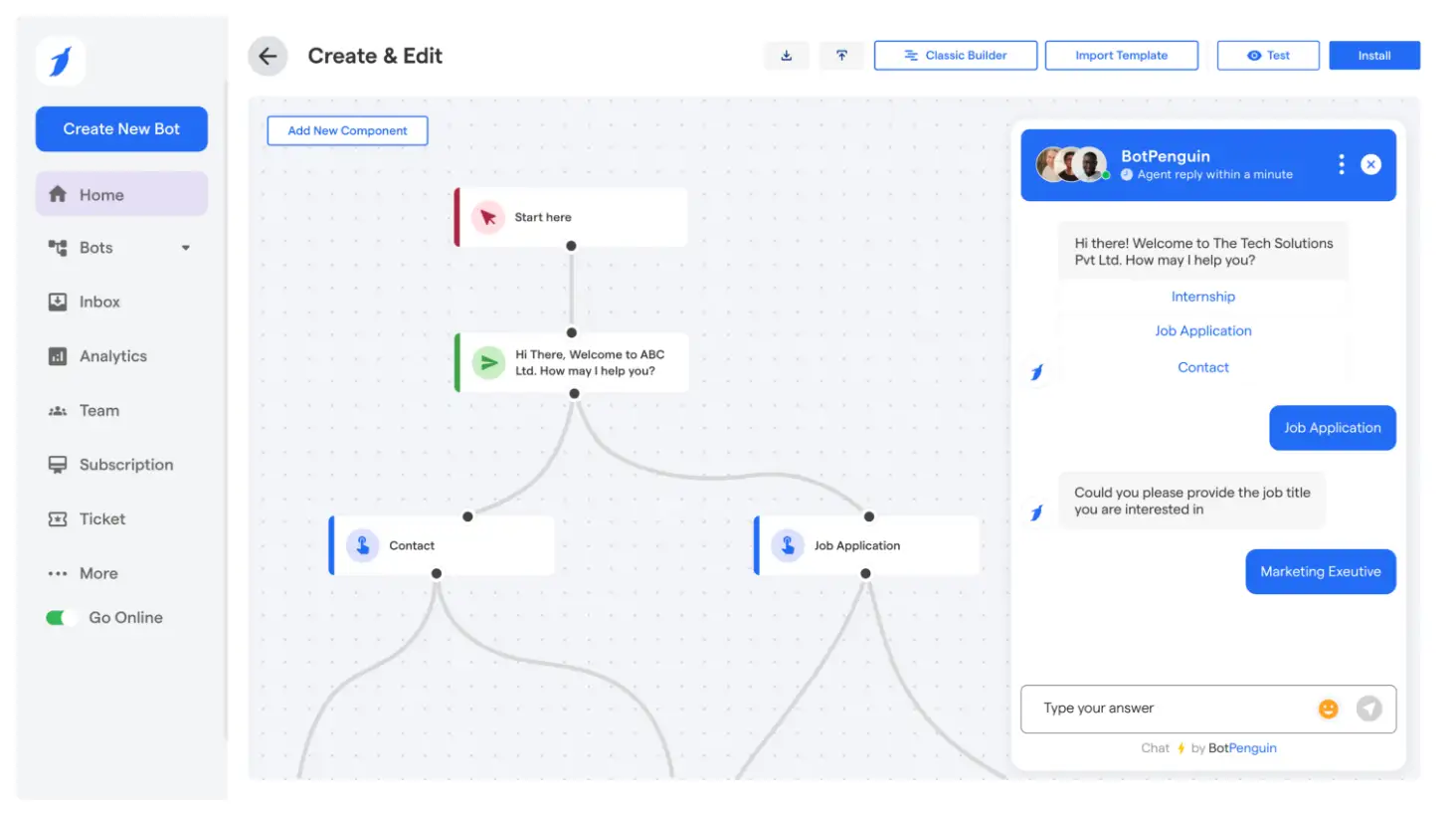
About:
BotPenguin is an AI cold calling tool designed for startups and growing businesses that need an affordable yet powerful automation platform.
It uses human-like voice AI to handle outbound calls, qualify leads, and update CRM systems automatically.
Key Features:
- Human-like voice assistant with real-time interaction
- CRM and tool integrations (e.g., HubSpot, Salesforce)
- Detailed analytics dashboard for call performance
- No-code setup and multi-channel support
Best For:
Startups, SMBs, agencies
Pros:
- Quick setup without technical expertise
- Cost-effective with pay-as-you-scale pricing
- Customizable call flows
- Works across voice, WhatsApp, chatbot, and more
Cons:
- Advanced custom workflows may need support
- Works best when integrated with CRMs
2. HubSpot Sales Hub AI Dialer
About:
Part of HubSpot's CRM suite, this AI dialer is built for sales teams that need centralized outreach and reporting within the HubSpot environment.
Key Features:
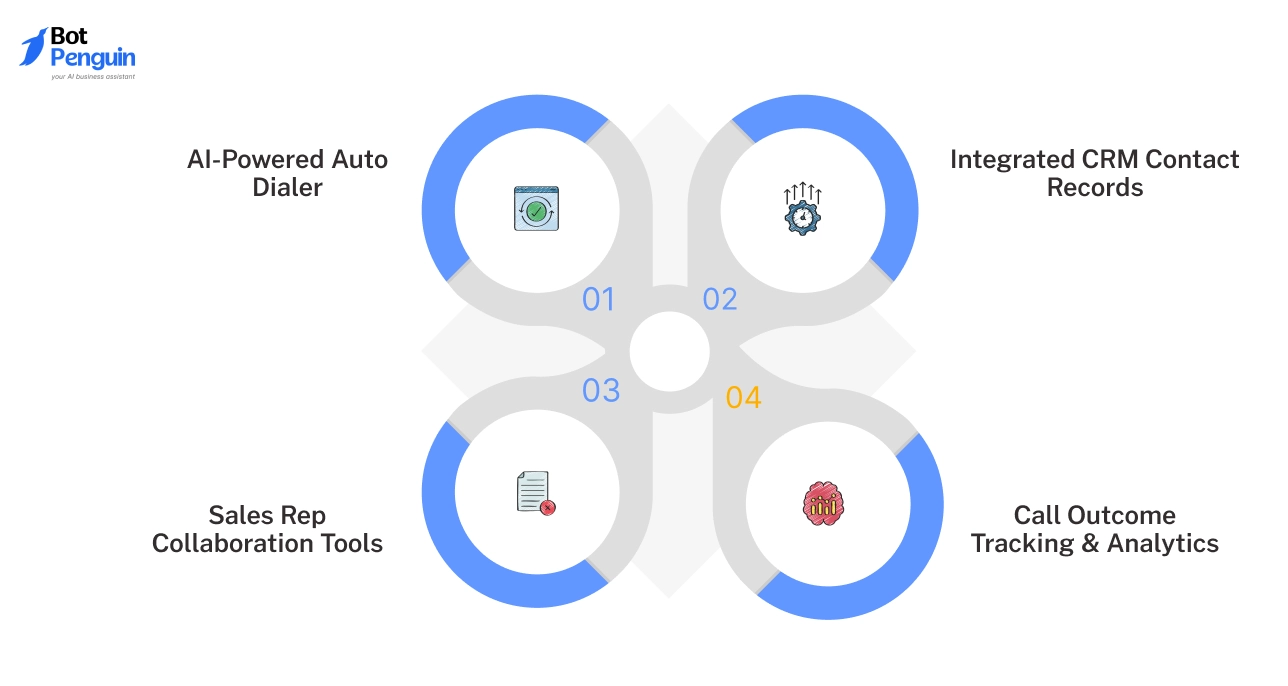
- AI-powered auto dialer with call logging
- Integrated CRM contact records
- Sales rep collaboration tools
- Call outcome tracking and analytics
Best For:
Mid-size businesses using HubSpot
Pros:
- Native integration with HubSpot CRM
- Clean UI and fast onboarding
- Good analytics and call tracking
Cons:
- Limited calling features outside HubSpot
- Higher cost for premium tiers
3. Regie.ai
About:
Regie.ai specializes in AI-generated sales scripts and personalization for outbound outreach. It helps reps create optimized talk tracks quickly.
Key Features:
- AI-generated call scripts and email sequences
- Personalization recommendations for outbound
- Content scoring and tone matching
Best For:
SDR teams focused on personalization
Pros:
- Saves time on content creation
- Improves call and email effectiveness
- Easy integration with outreach platforms
Cons:
- Not a standalone dialer
- Relies on pairing with sales engagement tools
4. Salesforce Einstein Voice
About:
Einstein Voice is Salesforce's voice AI layer that brings intelligence and automation to sales calls, insights, and workflows.
Key Features:
- Voice-to-text transcription and logging
- Forecasting and opportunity insights
- Lead scoring and rep performance metrics
Best For:
Large Salesforce-powered sales orgs
Pros:
- Enterprise-level analytics
- Deeply embedded in Salesforce workflows
- Excellent for coaching and reporting
Cons:
- High cost for small teams
- Only valuable if using Salesforce ecosystem
5. Outreach.io
About:
Outreach.io is a robust sales engagement platform that includes AI-powered call sequencing and tracking for outbound reps.
Key Features:
- Call sequencing and automation
- Activity tracking and reporting
- Prioritization based on intent data
Best For:
Sales teams in growth or enterprise stages
Pros:
- Centralized workflow automation
- Strong CRM integrations
- Built-in analytics
Cons:
- High learning curve for new users
- Pricing on the higher end
6. Gong.io
About:
Gong focuses on conversation intelligence. It records and analyzes calls to improve sales performance through data-backed coaching.
Key Features:
- Call recording and transcription
- Sentiment and keyword analysis
- Deal progression insights
Best For:
Coaching-focused sales teams
Pros:
- Excellent for rep training and QA
- Rich analytics and pattern tracking
- Works with most dialers and CRMs
Cons:
- Not an outbound calling system
- Expensive for small companies
7. Conversica
About:
Conversica acts as a virtual sales assistant to handle lead follow-ups and engagement via voice and email.
Key Features:
- Automated conversations via voice or email
- AI intent detection and response handling
- CRM integration and handoff to reps
Best For:
Mid to large sales teams needing follow-up automation
Pros:
- Keeps leads warm with consistent follow-up
- Scales without hiring more SDRs
- Good handover flow to sales
Cons:
- Limited calling features
- Setup and training may take time
8. Aircall AI
About:
Aircall is a cloud phone solution with AI enhancements for routing, tagging, and performance analytics.
Key Features:
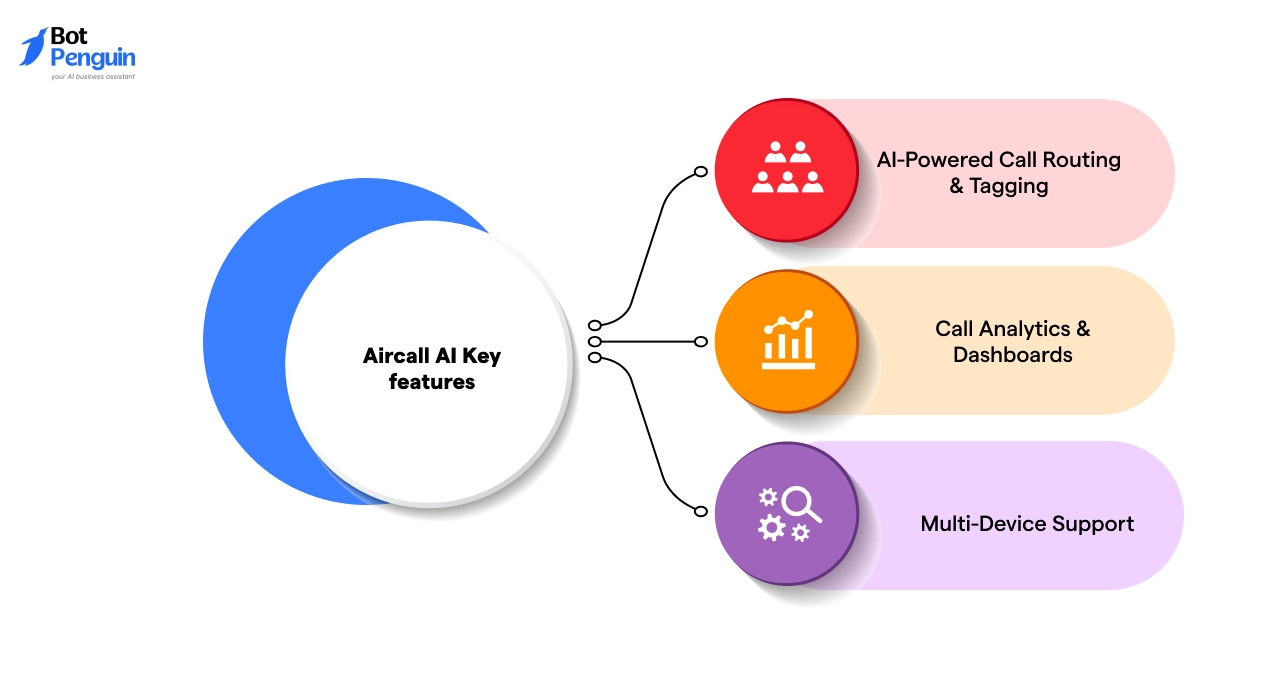
- AI-powered call routing and tagging
- Call analytics and dashboards
- Multi-device and CRM integration support
Best For:
Customer support and sales operations teams
Pros:
- Easy to deploy and use
- Strong support for remote teams
- Integrates with over 100 tools
Cons:
- AI features not as deep as competitors
- Higher pricing for advanced tiers
9. JustCall AI
About:
JustCall offers outbound calling with AI features like sentiment detection, call scoring, and productivity tracking.
Key Features:
- Auto dialer with call scoring
- Sentiment detection and speech analytics
- CRM sync and workflow automation
Best For:
SMBs and remote sales teams
Pros:
- Affordable and scalable
- AI-backed coaching insights
- Includes texting and voicemail drops
Cons:
- UI can get cluttered
- Premium AI features require higher plans
10. Kixie PowerCall
About:
Kixie is a sales engagement tool that offers power dialing, local presence, and AI-guided workflows to increase connect rates.
Key Features:
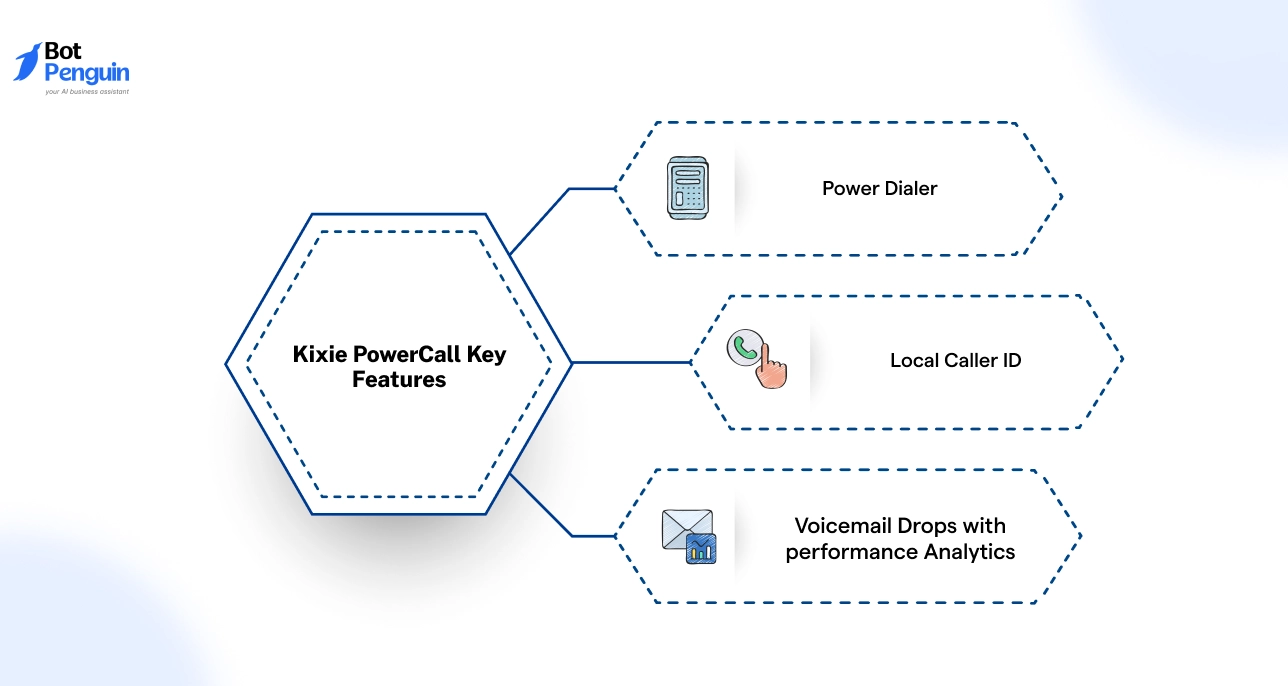
- Power dialer with click-to-call
- Local caller ID for better pickup rates
- Voicemail drops and analytics
Best For:
SMBs and agencies with outbound focus
Pros:
- Easy to set up
- High connect rate improvement
- Great CRM integrations
Cons:
- Limited advanced AI analysis
- Works best for outbound, not full-cycle sales
Each of these tools addresses different business needs. Whether you are scaling outreach, improving lead quality, or automating follow-ups, there’s an AI cold calling tool that fits your workflow. Choose based on your team size, budget, and integration goals.
How to Choose the Right AI Cold Calling Software for Your Business
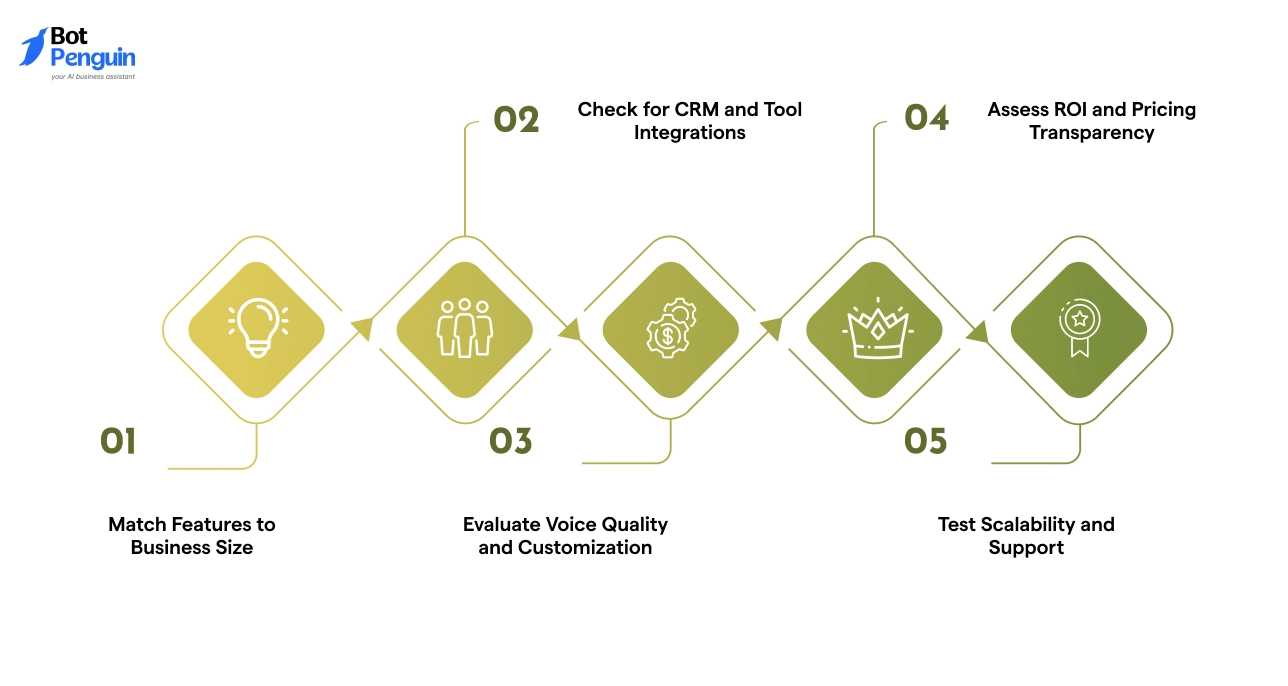
Choosing the right AI cold calling software can determine how effectively your team reaches and converts prospects. Every business has unique goals, call volumes, and system requirements.
The right choice should align with these needs while ensuring performance, accuracy, and scalability. This section outlines practical criteria that help identify which solution fits best for your business model.
1. Match Features to Business Size
Small and medium businesses usually need simple tools that automate calling, record leads, and support a few integrations. Enterprises, on the other hand, require more advanced features such as multi-department access, advanced analytics, and workflow automation.
When assessing options, businesses should evaluate whether the tool scales easily as call volumes grow. Selecting the right feature set prevents overspending on functions that add little value.
2. Check for CRM and Tool Integrations
Integration plays a major role in ensuring data consistency across teams. The AI cold calling tool should connect with CRMs, email platforms, and marketing systems to centralize customer data.
For example, when a call ends, the system should automatically update lead status and notes inside the CRM. This removes manual input, avoids duplicate entries, and allows sales teams to act on real-time information.
3. Evaluate Voice Quality and Customization
Voice clarity directly affects engagement rates. A professional and natural voice tone keeps prospects interested throughout the conversation. Businesses should test the AI system’s voice options and customization features to ensure they match their target audience.
Advanced tools allow adjustments in tone, accent, and pacing to maintain brand consistency. Testing these capabilities during a demo ensures that every interaction reflects the company’s communication style.
4. Assess ROI and Pricing Transparency
Before investing, organizations should calculate potential returns by comparing call volume capacity, conversion rates, and operational cost savings.
AI for cold calling solutions often differ in pricing based on usage, feature access, or support tiers. A transparent pricing model allows accurate forecasting and helps avoid hidden costs.
Businesses should prioritize tools that demonstrate measurable performance improvements such as higher lead conversion or lower cost per acquisition.
5. Test Scalability and Support
Reliable customer support and scalability are essential for long-term adoption. As outreach expands, the platform should handle larger call volumes and integrate with additional tools without disruptions.
Support availability during campaign hours ensures that issues are resolved quickly, maintaining consistent performance.
Evaluating these parameters ensures that the selected AI cold calling software aligns with business objectives and technical workflows. For teams looking for a flexible and affordable solution, BotPenguin’s AI Voice Agent offers enterprise-grade capabilities tailored to modern sales operations.
Real-World Use Cases of AI Cold Calling Tools
The true value of AI cold calling tools lies in how they are applied to solve everyday sales challenges. From startups to large enterprises, businesses are using AI to reduce workload, improve efficiency, and accelerate conversions.
Below are practical examples of how AI for cold calling is transforming different types of organizations.
1. B2B SaaS Startups: Automating Demo Scheduling
SaaS startups depend heavily on demos to convert leads into paying users. Handling scheduling manually often leads to delays and missed follow-ups. With AI cold calling software, startups automate demo outreach entirely.
- When a lead signs up or downloads a brochure, the AI automatically calls to confirm interest.
- It qualifies the lead, books an appointment, and updates the CRM instantly.
This process ensures that every potential customer is contacted promptly, and no opportunity slips through. Sales teams can then focus on meaningful conversations instead of administrative coordination.
2. Agencies: Running High-Volume Lead Generation Campaigns
Marketing and sales agencies often manage multiple campaigns at once. Manual calling cannot match the required pace or consistency. Using AI-powered cold calling, agencies handle thousands of outbound calls automatically.
- The AI system categorizes responses as interested, follow-up required, or not relevant.
- Each interaction is logged in real time, keeping the client CRM updated.
For example, a digital marketing agency working with a real estate client can use AI to call prospects, share property details, and forward qualified leads to the client’s sales team. This approach reduces manual effort while improving client satisfaction and campaign ROI.
3. Enterprises: Scaling and Standardizing Sales Operations
Large enterprises need consistency across regional and departmental sales teams. AI cold calling tools help maintain quality while scaling outreach efforts.
- The system applies standardized scripts across all campaigns.
- Supervisors access centralized analytics dashboards to track performance.
- Predictive dialing and sentiment analysis identify high-intent leads quickly.
This structure allows enterprises to manage massive outbound campaigns efficiently while maintaining accurate data and compliance standards across departments.
In summary, AI cold calling software delivers measurable value in real-world operations by increasing speed, precision, and control. Whether it is automating demo bookings, managing agency campaigns, or scaling enterprise outreach, AI adapts to every business requirement.
The next section explores how BotPenguin’s AI Voice Agent brings these capabilities together for modern sales teams looking to automate and grow intelligently.
Simplify Cold Calling with BotPenguin's AI Voice Agent
After seeing how AI tools transform outbound sales, the next step is understanding how one platform brings it all together. BotPenguin’s AI Voice Agent simplifies cold calling by combining automation, intelligence, and accessibility.
It helps businesses engage more leads, reduce manual effort, and gain performance insights — all without technical setup or heavy investment.
1. Natural and Human-Like Voice Interaction
The AI Voice Agent uses advanced voice technology to deliver conversations that sound professional and natural. It adapts tone, pacing, and language dynamically to match human interaction.
Whether scheduling product demos or qualifying leads, the experience feels authentic and engaging. Businesses using the system maintain a consistent brand voice while improving customer response rates.
2. CRM and Lead Management Integration
Every interaction handled by the AI is automatically recorded and synced with connected CRMs.
Lead details, call notes, and outcomes are updated instantly, ensuring sales teams always work with accurate data. This integration helps eliminate manual data entry and keeps lead tracking transparent.
For example, a sales manager can see every prospect’s call history and follow-up status in real time.
3. Real-Time Analytics and Call Insights
The integrated analytics dashboard gives teams complete visibility into performance metrics. It tracks connect rates, lead engagement, and conversion outcomes.
Businesses can analyze which campaigns deliver better results, when prospects are most responsive, and which scripts perform best. These insights guide data-driven decisions and continuous process improvement.
4. No-Code Setup with Pay-as-You-Scale Flexibility
BotPenguin is built for simplicity. The platform uses a no-code setup, allowing teams to start campaigns quickly without technical expertise.
Its pay-as-you-scale model ensures businesses only pay for what they use. This makes advanced automation affordable for startups and scalable for enterprises planning large outreach operations.
In short, BotPenguin’s AI Voice Agent combines automation, CRM syncing, analytics, and natural voice interaction to make cold calling efficient and cost-effective. It empowers businesses to reach more prospects with less effort while maintaining a professional and personal touch.
Final Thoughts
The growing adoption of AI cold calling software marks a clear shift in how sales operations are managed today.
Businesses are moving beyond manual processes toward systems that deliver faster outreach, accurate insights, and measurable outcomes.
By automating repetitive tasks and improving lead engagement, AI is helping teams achieve more in less time without increasing costs or staff workload.
Organizations using AI for cold calling benefit from enhanced productivity, consistent performance, and real-time analytics. Sales teams can focus on building relationships instead of managing data, while AI handles the heavy lifting — from lead qualification to follow-ups.
The result is higher efficiency, lower operational costs, and a scalable outreach model that supports long-term growth.
For example, startups can use automation to manage demo scheduling and lead nurturing without hiring additional staff, while larger enterprises can standardize global campaigns with uniform performance tracking.
Across all use cases, the outcomes remain consistent — more qualified leads, faster conversions, and better visibility into every stage of the sales cycle.
AI cold calling tools help businesses save time, reduce costs, and scale without burnout. They combine automation, intelligence, and data accuracy to create a more efficient outbound strategy that delivers results.
Frequently Asked Questions (FAQs)
What is AI cold calling software used for in modern sales?
AI cold calling software is used to automate outbound communication, qualify leads, and improve follow-ups through data-driven calling, reducing manual work while enhancing conversion efficiency.
How does AI for cold calling help improve customer engagement?
AI for cold calling personalizes every interaction using data insights, ensuring relevant communication that improves engagement, response rates, and overall customer experience during outreach campaigns.
What are the advantages of using AI-powered cold calling for startups?
AI-powered cold calling allows startups to scale lead generation, manage calls efficiently, and focus resources on sales strategy rather than manual dialing or scheduling tasks.
Can AI cold calling software integrate with existing business tools?
Yes, AI cold calling software integrates with CRM, analytics, and marketing tools to create a unified system for managing calls, tracking leads, and analyzing performance.
Why should businesses choose BotPenguin’s AI cold calling tool?
BotPenguin’s AI cold calling tool offers no-code setup, CRM integration, analytics tracking, and cost-effective scalability, making it ideal for businesses aiming to automate outreach and improve sales performance.
